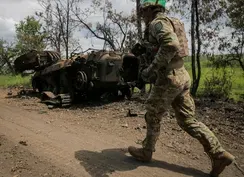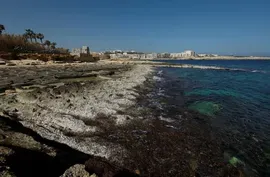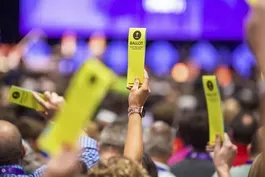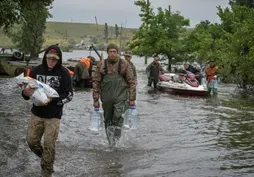
Investigation reveals rampant human rights abuses at sea
Clip: 6/15/2023 | 9m 49sVideo has Closed Captions
Investigation reveals rampant environmental and human rights abuses at sea
The world's oceans are, in many ways, lawless places where piracy, overfishing, toxic waste dumping and even murder are routine. William Brangham spoke with journalist Ian Urbina, head of the Outlaw Ocean Project, about cold-blooded killings on the water. A warning: this story includes disturbing details.
Problems with Closed Captions? Closed Captioning Feedback
Problems with Closed Captions? Closed Captioning Feedback
Major corporate funding for the PBS News Hour is provided by BDO, BNSF, Consumer Cellular, American Cruise Lines, and Raymond James. Funding for the PBS NewsHour Weekend is provided by...

Investigation reveals rampant human rights abuses at sea
Clip: 6/15/2023 | 9m 49sVideo has Closed Captions
The world's oceans are, in many ways, lawless places where piracy, overfishing, toxic waste dumping and even murder are routine. William Brangham spoke with journalist Ian Urbina, head of the Outlaw Ocean Project, about cold-blooded killings on the water. A warning: this story includes disturbing details.
Problems with Closed Captions? Closed Captioning Feedback
How to Watch PBS News Hour
PBS News Hour is available to stream on pbs.org and the free PBS App, available on iPhone, Apple TV, Android TV, Android smartphones, Amazon Fire TV, Amazon Fire Tablet, Roku, Samsung Smart TV, and Vizio.
Providing Support for PBS.org
Learn Moreabout PBS online sponsorshipWILLIAM BRANGHAM: It all started with a lost cell phone found in the back of a taxicab in Fiji.
And on that phone was cell phone video filmed on a ship in the Indian Ocean and showing what clearly seemed to be a series of cold-blooded murders.
Tracing that crime, who the victims were, who the killers were, and who in the end was responsible has been the work of a journalistic collaborative called The Outlaw Ocean Project.
Let's see an excerpt from their story reported by the group's head, Ian Urbina.
And a warning: What you're about to see is disturbing.
IAN URBINA, The Outlaw Ocean Project: A 10 minute slow-motion slaughter caught on camera.
The footage had gone viral.
Interpol had come to me, as this is exactly the sort of brutality at sea I report on.
I could tell the capsized boat was a traditional East African dhow while the shooting is being ordered in Chinese.
The circumstances surrounding these killings have remained a mystery.
No one even reported the incident, and no one was doing anything about it.
How could such a crime happen and remain untouched?
What made offshore violence different and near impossible to solve?
A breakthrough came from a private open-source intelligence company called Trygg Mat Tracking.
I contacted them and asked to help investigate this crime, since virtually no one else in the world was doing so.
DUNCAN COPELAND, Executive Director, Trygg Mat Tracking: My name is Duncan Copeland.
I'm the executive director of Trygg Mat Tracking, commonly known as TMT.
What we did was, we pieced together, from the very grainy and very shaky footage, different areas of the vessel.
We then ran a comparison through our systems.
And, in the end, we looked at over 3,000 photos of around 300 vessels.
And, luckily, we were able to hit on two vessels that match enough of the features and one, in particular, that had a fairly high confidence level.
And that boat was a vessel called the Ping Shin No.
101.
So, Taiwan was the flag state, but it also been licensed by Seychelles for some time to operate in their waters.
IAN URBINA: It's a complex picture, ships that belong to one country and who fly the flag of another with an international crew.
The Ping Shin No.
101 belonged to Taiwan, one of the largest fleets in the world.
It had a Chinese captain, a boson and deckhands from a half-dozen different countries.
It was part of a notorious scofflaw fleet operating under other national flags that allowed it to breach international fishing laws with regular impunity.
It was already under the E.U.
's yellow card system for violations and aggression to smaller artisanal vessels.
Operating in a pack, the Ping Shin 101 had all the advantages over that patch of ocean.
A small dhow didn't stand a chance.
In collaboration with TMT, my staff combed thousands of Facebook pages and open-source images, and we were able to identify the culprits, if not the cause, of the killing.
DUNCAN COPELAND: This was not a piracy attack.
In this case, the crew interviews seemed to indicate that this had been taken to a whole other level by this particular captain, and that he had become very aggressive and very confrontational with other vessels that might be fishing in the region that he wanted to target.
IAN URBINA: The captain not only ordered the security guards to fire, but at one point actually took the weapon and fired it himself.
It was certainly more than the four people killed that you see on camera that died that day.
And, more likely, it was closer to 10 or 15.
What became obvious to me is that were it not for a killing caught on a cell phone camera left carelessly in a taxi in Fiji, no one anywhere would have known that this had taken place.
Despite dozens of witnesses and troves of evidence, violent crimes occur regularly and with full impunity, because the work force that operates in this space is poor, invisible, and has no leverage with the law.
It also occurs because there's no requirement under maritime law to report it, no central database for logging crimes, and flag registries don't want investigations that may require them to actually do something about it, because the legalities of doing so are complex and costly.
The old saying is, crime is only countered as much as it is counted.
And, at that sea, that's not much.
There are no skid marks on the outlaw ocean.
Here, bodies and evidence simply sink beneath the waves.
WILLIAM BRANGHAM: And joining me now is journalist Ian Urbina, head of The Outlaw Ocean Project.
You and I talked eight years ago at this very table about this case that you document in this piece.
Back then, the video had just recently come to light.
You detail this somewhat in your piece, but tell us a little bit more about why it took so long to get to the bottom of this.
IAN URBINA: Yes.
I mean, it's just shocking reality of crimes that sea that, typically, there isn't interest from governments or law enforcement.
Partially, that's it's a difficult place to investigate, and evidence is sparse, the jurisdiction and who has the right to investigate and what to do with that evidence, if you can find it.
And, in this case, we had the evidence of cell phone footage, but it wasn't clear when, where and who were the culprits and the victims.
So, for all these reasons, no government wanted to touch it.
WILLIAM BRANGHAM: And you don't have any reason to believe that this is a one-off, isolated case.
IAN URBINA: Unfortunately not.
I mean, you hear when you talk with deckhands from distant water fishing vessels about egregious crimes.
The U.N. in 2009 did a deep investigation of deckhands on the South China Sea and found that 49 percent of deckhands had witnessed murder of other crew on board the ships they have worked.
So this is not... WILLIAM BRANGHAM: Almost half.
IAN URBINA: That's right.
This is not unusual.
WILLIAM BRANGHAM: You do a whole series of investigative reports in this project.
And one of them, it's touched on in this, and you seem to be getting at the same, is that many of these workers on the high seas are basically indentured or slave-like.
Again, how does that circumstance come to be?
IAN URBINA: So, distant water fishing in general is a high-labor, low-profit industry.
Most middle-class First World countries do not want to work those jobs.
And so recruitment of deckhand tends to focus on the global South.
The manning agency or employment agencies tend to recruit inland, often illiterate, very poor workers.
Indonesia, Philippines are big producers of labor.
These folks get recruited onto the vessels, and then spend two years at sea, sometimes upwards of three.
And, often, they're debt-bonded, in the sense that they get recruited, they don't have any money, they don't have the funds to make that trip.
So they accrue a debt with the trafficker.
And that debt is handed over to the captain, and then they have to work to pay off that debt.
And that's the debt bondage.
WILLIAM BRANGHAM: And obviously, no unions, no polices, no one, no H.R.
departments to be going to.
IAN URBINA: Quite right.
WILLIAM BRANGHAM: Another one of the episodes in your series features what's called the Magic Pipe.
Can you explain what that is and why shipping companies use that?
IAN URBINA: The Magic Pipe is -- it's usually a four-or-five-meter-long tube that connects the storage container that holds the dirtiest waste on shipping vessels that you're supposed to carry, and then unload when you get into port.
And it's costly and time-consuming for large ships to do it the right way, the legal way.
So the solution is, you want a Magic Pipe that goes underneath the ship and disappears -- that's what magic -- this sludge, this oil into the ocean.
And it's easy to get away with it because no one's out there looking for it.
So, oil spills are bad, but intentional spilling is much worse.
WILLIAM BRANGHAM: And this is - - your report documents how, because there is no overarching governing authority that's able to sort of enforce any of these rules, that that's why these things just go on.
Is there any push to try to create some form of more efficient jurisdiction and enforce these types of laws, or not?
IAN URBINA: So, the notion of having a international police force, Blue Helmets of the high seas, some -- is not one that carries much traction, especially in this day and age.
So there isn't really a push for that.
There are alternate efforts.
So all these ships at some point have to come to land.
And so they're entering ports.
Those nations, if they want, can sign on to various agreements that say, essentially, when any ship comes into your port, you're going to check for these things.
And there are other decentralized tactics, like using satellites to monitor where ships are going and what they're up to, and then applying pressure to the market players, the companies that benefit from these vessels, and saying, you're associated with crimes.
Are you OK with that?
WILLIAM BRANGHAM: All right, it is called The Outlaw Ocean Project.
Ian Urbina, good to see you.
IAN URBINA: Thanks for having me.
A look at the life of actor turned politician Glenda Jackson
Video has Closed Captions
A look at the life of actor turned politician Glenda Jackson (6m 44s)
On the frontline with Ukrainian counteroffensive forces
Video has Closed Captions
On the frontline with Ukrainian forces as they step up counteroffensive against Russia (5m 31s)
Scientists issue dire warnings as ocean temperatures spike
Video has Closed Captions
Scientists issue increasingly dire warnings as ocean surface temperatures spike (6m 35s)
Southern Baptist Convention votes to ban female pastors
Video has Closed Captions
Southern Baptist Convention bans female pastors, ejecting several churches in the process (8m 33s)
UN aid chief on far-reaching consequences of dam collapse
Video has Closed Captions
UN aid chief on far-reaching consequences of Ukrainian dam disaster (9m 17s)
Providing Support for PBS.org
Learn Moreabout PBS online sponsorshipSupport for PBS provided by:
Major corporate funding for the PBS News Hour is provided by BDO, BNSF, Consumer Cellular, American Cruise Lines, and Raymond James. Funding for the PBS NewsHour Weekend is provided by...
















